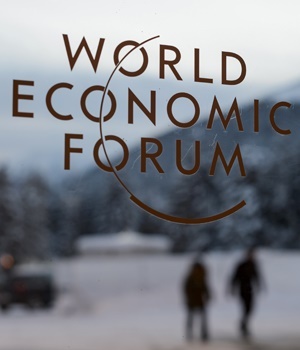
Data, devices, algorithms, sensors and humans all form part of the future manufacturing landscape known as Industry 4.0.
It is a new global way of making goods and providing services, and will top the agenda at next week’s World Economic Forum.
Is Africa ready for this new technology?
Could this be the wave Africa has been waiting for to finally shift the balance of economic power and take the continent to the forefront as a global player?
It depends on how Africa plays its hand, writes Yonela Diko
Last year’s theme for the annual meeting of top business and political leaders, economists and even celebrities in Davos, Switzerland, was Creating a Shared Future in a Fractured World.
It came as a natural response to a new, emerging global reality that countries – including the US under President Donald Trump and parts of Europe – were becoming more isolationist and less cooperative and concerned about the family of nations.
A world of zero-sum games was on the rise.
It is ironic that the US and Europe harbour this irrational sense of feeling undone by globalisation, especially regarding trade and immigration.
Consider the genuine cry by most of the developing and underdeveloped world – particularly countries of the Global South – regarding the unequal status of countries in terms of their development, economic activities, respective GDPs and ability to attract foreign direct investment.
This means that the gains of globalisation will always be unevenly shared, with an unfairly bigger chunk going to the developed countries in the global north.
This year’s World Economic Forum (WEF), however, offers an opportunity to have a different conversation about new possibilities – specifically, about whether the fourth industrial revolution can finally be an equaliser and ensure that, irrespective of where one is, the global pie is sliced more evenly, should the countries of the world desire this.
This year’s theme for Davos – Globalisation 4.0: Shaping a Global Architecture in the Age of the Fourth Industrial Revolution – offers new global possibilities that may not have existed before.
The internet has rendered countries’ borders meaningless.
Whether one lives in a dwindling town or an emerging supercity such as Dubai or the cauldron of capitalism that is New York City, everyone is easily able to connect at the click of a button and make transactions.
With the new wave of digitisation, and the possibility that soon all human interaction will be run by technology of some sort, what was only a tiny possibility will now be part of the mainstream – and the world will never be the same again.
If this digital revolution is anchored properly, it will have implications for other global challenges, such as immigration, transportation, communication and trade.
In addition, “creative destruction” will be the order of the day as old businesses collapse and new ones emerge.
No human being will need to migrate from their village. Trade will quadruple, and transportation and communication will extend to parts of the world it was hitherto unthinkable for them to reach.
So, the global economy may well make generational leaps forward.
But it is not a given that the gains of this digital revolution will automatically be shared equally, even as such a radical change offers a unique opportunity in history to reduce global inequality.
The revolution is not linear and not in the hands of a particular group, so it can be neither controlled nor hindered.
In such an environment, it is clear what needs to be done by each of the world’s governments to maximise the gains of this new digital age.
The ANC government has already pronounced itself on this matter. President Cyril Ramaphosa carries the party’s mandate into the world. It is a mandate that no doubt all other governments naturally share.
Africa is at the lower end of development and technology penetration. Surprisingly, this may put the continent at an advantage as it is free from trying to turn old, massive technology investments into new ones.
As has been said, Africa can merely leapfrog into new technologies without the burden of old ones.
For example, the Global System for Mobile Communications predicts that 80% of the 800 million people in sub-Saharan Africa will have a mobile device by 2020 – double the number of people possessing such devices today.
This, while sub-Saharan Africa is still only 31% electrified.
While many Africans may have missed out on owning gadgets such as landlines, desktops and laptops, we have acquired cellphones in record time, and record numbers.
But the digital revolution is not only about smartphones.
There are obstacles, to be sure – with such low levels of education in sub-Saharan Africa, even skills transfer projects from leading innovating partners such as China may be difficult.
As with other periods of flux, if governments do not put certain things in place, there will be winners and losers in this revolution.
The ANC has asked, correctly: How do we ensure that this digital revolution does not entrench existing economic disparities and worsen the digital divide?
The only way to avoid this is for governments to position themselves as leading users of technology in their respective countries in order to take everyone else, especially the poor and marginalised, forward.
The days when governments are the last to catch up with technological advances are over. In most countries – and South Africa is no exception – governments are years behind the private sector in their use of technology.
Hence the urgency for governments to modernise their telecommunications policies. A good place to start is with upgrading their infrastructure to enable technology to function across all departments, from education to health to policing.
This policy must also speak to how the digital revolution can help increase the participation of each country’s citizens in their respective democracies.
Most citizens in rural and remote areas simply see government programmes being implemented, without ever being afforded the chance to access information about plans and projections and, most importantly, to offer their views about such plans.
Important questions to ask about Davos 2019 are: How do we make the right investments for 4.0? How do we reshape our existing infrastructure for the future digitised world?
As we build new infrastructure and upgrade the old, the area with the most potential to undermine this digital revolution and cripple its ability to change lives is cybersecurity and the vulnerability of private information.
If our earnings, our activities and our children – in short, our entire lives – are available at a click of a button, technology becomes a weapon that those with evil intentions can use to harm others.
Through technology, the World Bank points out, “small farmers can find out how much they should be charging for their crops.
People can buy solar energy using a phone, get their hearts examined in rural Cameroon using a medical tablet, or get blood delivered by drones in Rwanda.”
It is time for us to get to work.
Diko is a media strategist and social commentator




 Publications
Publications
 Partners
Partners









